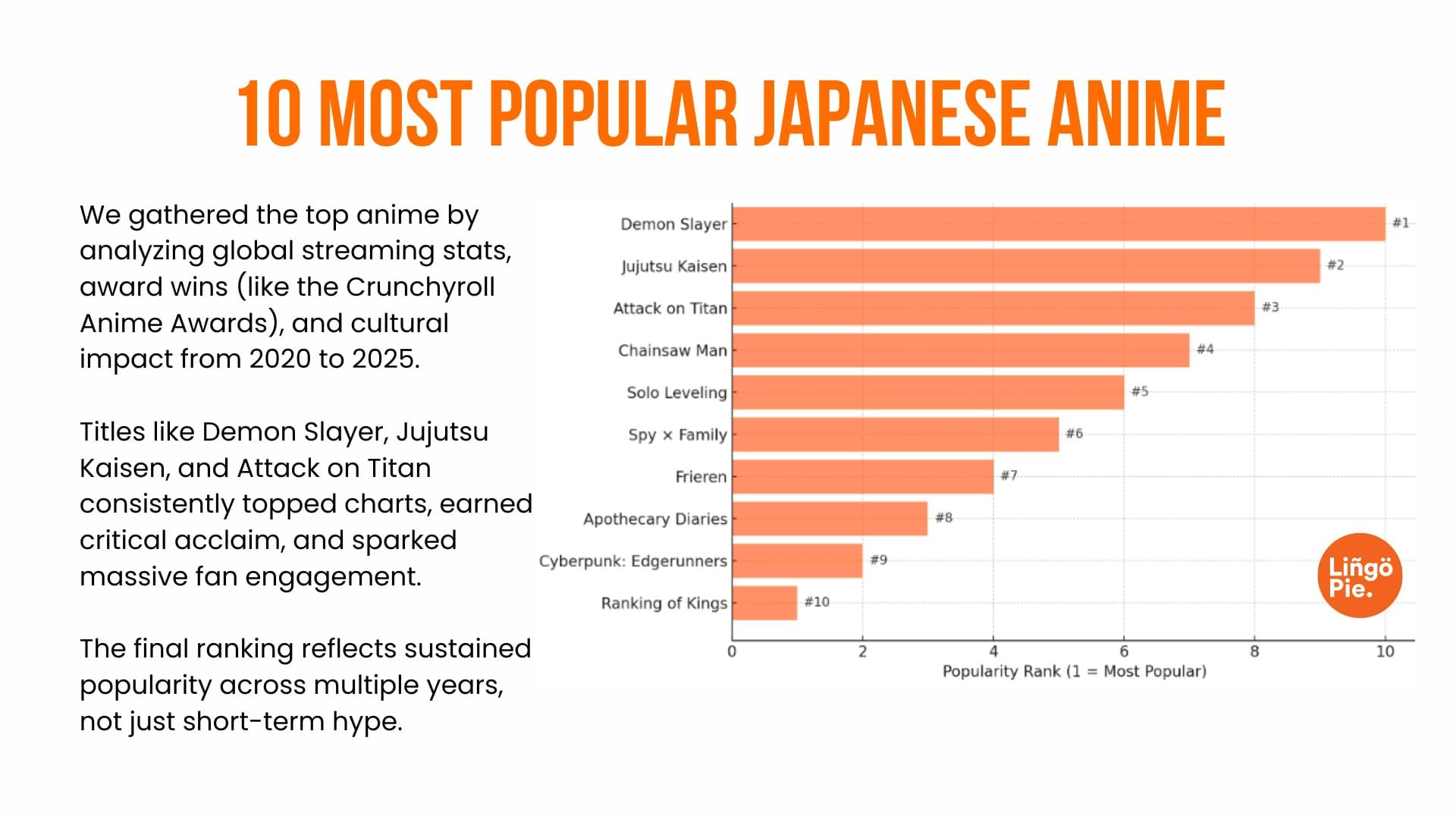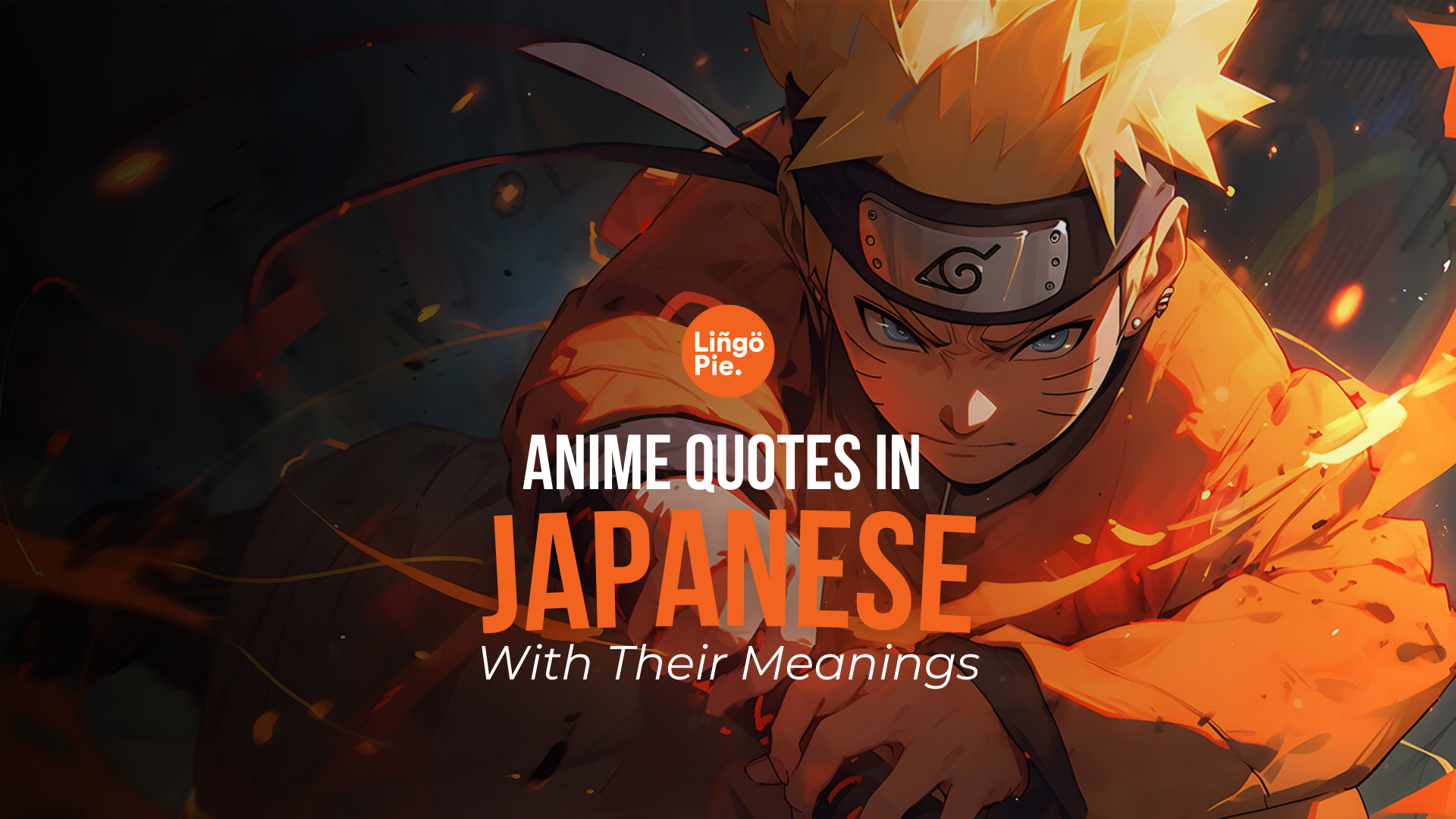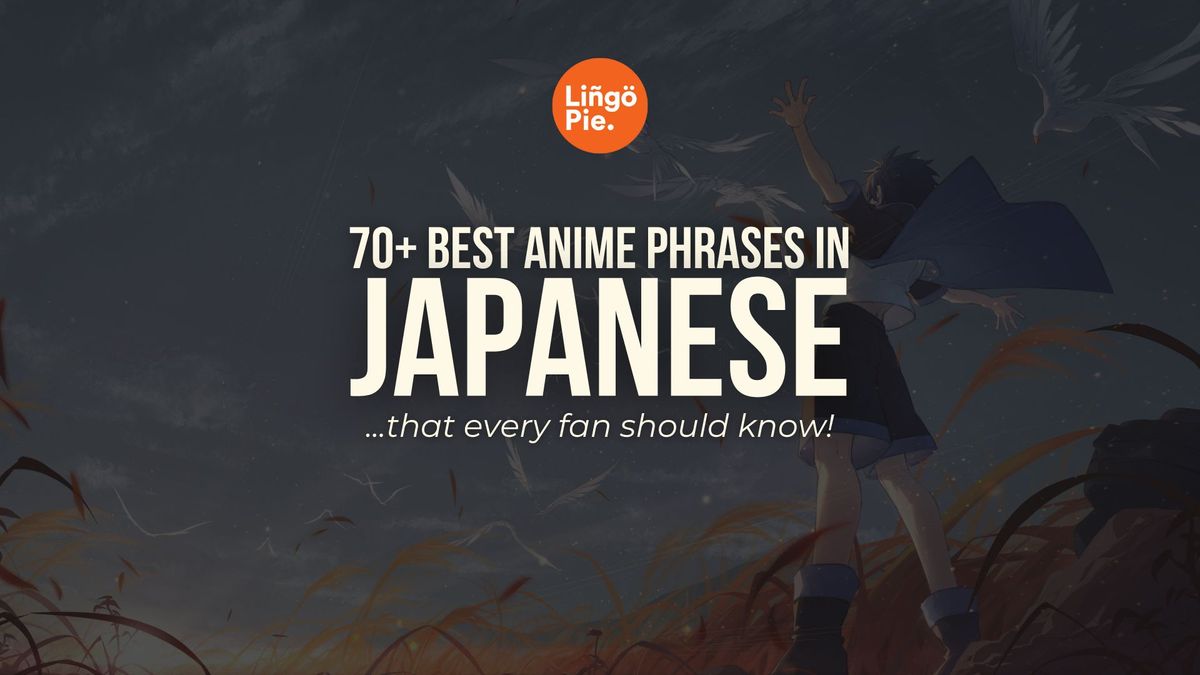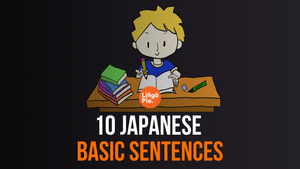When learning basic Japanese words, you might focus on greetings, simple questions, and polite phrases. But once you start watching anime or interacting with native speakers, you’ll quickly realize that textbook basics aren’t enough. Real Japanese actually relies heavily on context, tone, and expressions that carry meaning far beyond their dictionary definitions.
In this post, we’ll cover the most common Japanese phrases and interjections you hear in anime, from everyday expressions to dramatic villain lines. What we’ll feature below is guaranteed to help you sound more natural, understand emotional nuance, and connect more deeply with the Japanese language and culture.

Why Learn Japanese Anime Phrases?
While textbooks teach structure, anime teaches style. The phrases used in anime reflect how Japanese is spoken daily, with emotional nuance, casual slang, and real conversational rhythm. Learning them helps bridge the gap between formal language study and how people talk, especially in informal or peer-level settings.
Anime also provides built-in context that makes learning stick. When a phrase is tied to a memorable scene or character moment, it becomes easier to recall and apply. For language learners, that means more than memorizing vocabulary—it means understanding tone, intent, and cultural subtext, which are often the hardest parts of mastering any language.

18 Most Common Japanese Anime Phrases
When watching anime, certain Japanese phrases pop up so frequently that they become part of your vocabulary without you even trying. These expressions are the building blocks of anime dialogue, creating those memorable moments that stick with you long after the credits roll.
"Chotto matte" (ちょっと待って) - Wait a moment!
This versatile phrase can range from a gentle request to a dramatic shout when a character needs someone to stop in their tracks. You'll hear it when friends chase each other down hallways or when someone needs to interrupt an important conversation.
"Konnichiwa" (こんにちは) - Hello/Good afternoon
The classic greeting that opens countless interactions in anime. Notice how characters bow slightly when saying it, showing the beautiful blend of language and cultural gesture that makes anime so immersive.
"Kawaii" (可愛い) - Cute
Possibly the most exported Japanese word worldwide! Characters exclaim this when encountering adorable mascots, blushing love interests, or anything that brings that heart-melting feeling. The way it's stretched out ("Kawaiiiiii~") often indicates just how overwhelmingly cute something is.

"Nani?" (何?) - What?
The perfect reaction shot expression. Used when characters are shocked, confused, or completely blindsided by a revelation. The more dramatic the situation, the more emphasis on the "NA-NI?!"
"Sugoi" (すごい) - Amazing/Awesome
This enthusiastic expression of wonder works for everything from a friend's cool new gadget to a hero's spectacular power move. Listen for how the middle syllable stretches when someone is truly impressed: "Sugooooi!" It's the perfect way to show genuine amazement at something extraordinary.
"Hontō?" (本当?) - Really?/Is that true?
When characters express disbelief or need confirmation, this questioning phrase comes out. It's often paired with widened eyes or a tilted head, showing curiosity or skepticism.
"Shinjirarenai" (信じられない) - I can't believe it
The go-to phrase when something truly unbelievable happens. Listen for this during plot twists or when a character witnesses something thought impossible. The emotional weight in how it's delivered tells you everything about the magnitude of the surprise.
"Sasuga" (さすが) - As expected/Impressive
A word of admiration used when someone lives up to their reputation. When the class genius solves an impossible problem or the legendary warrior defeats a powerful enemy, you'll hear this acknowledgment of their skill.
"Wakatta" (わかった) - I understand/Got it
This affirmative response signals comprehension or agreement. It's particularly satisfying when a character finally grasps an important concept or agrees to a plan of action.
"Daijōbu" (大丈夫) - It's okay/Are you okay?
One of anime's most heartfelt expressions, used both as a question and reassurance. This versatile phrase works when checking on an injured friend or providing comfort in difficult times. The gentle way it's often spoken carries emotional weight across language barriers.

"Yamete kudasai" (やめてください) - Please stop
This versatile phrase ranges from playful to serious depending on the context and tone. You'll hear it when friends are teasing each other too much, when someone's crossing personal boundaries, or in more intense dramatic moments. The shortened "Yamete!" is often used in casual situations with close friends.
"Ryoukai" (了解) - Roger/Understood
This crisp, military-style acknowledgment signals complete comprehension and readiness to act. You'll hear it during missions, team operations, or any situation requiring clear confirmation. It carries more formality and precision than the casual "wakatta," making it perfect for high-stakes situations.
"Akiramenai de" (諦めないで) - Don't give up
The ultimate motivational phrase in anime! This encouragement appears in critical moments when all seems lost, inspiring characters to find their inner strength and persevere.
"Gochisousama deshita" (御馳走様でした) - Thank you for the meal
Said after finishing a meal to express gratitude. This culturally significant phrase appears whenever characters eat together, highlighting the importance of food and gratitude in Japanese culture.
"Yokatta" (よかった) - What a relief
This expression of relief comes with a sigh when tension finally breaks. After a character survives danger or receives good news, this heartfelt word captures that moment of emotional release.
"Muri muri" (無理無理) - That's impossible/No way
Often said with waving hands or head shaking, this emphatic refusal or declaration of impossibility shows a character's boundaries or disbelief. The repetition adds emphasis to just how impossible something seems.

"Ganbare" (頑張れ) / "Ganbatte" (頑張って) - Do your best/Good luck!
The ultimate motivational phrase in anime! You'll hear this encouraging shout before big competitions, difficult battles, or any challenging moment. It perfectly captures that beautiful Japanese concept that acknowledges difficulty while expressing complete faith in your ability to overcome it.
"Doki doki" (ドキドキ) - Heartbeat/Pitter-patter
This onomatopoeic phrase mimics the sound of a racing heart during moments of excitement, nervousness, or romance. You'll hear characters whisper this during first encounters with their crush or before stepping into danger. It's a beautiful example of how Japanese uses sound to express emotion directly!

10 Common Japanese Interjections In Anime
When watching anime, you'll notice those short, emotionally-packed sounds characters make that instantly communicate their feelings. These aren't just random noises—they're meaningful Japanese interjections that add color and authenticity to conversations. These little sound bursts are actually your secret weapon for sounding more natural when speaking Japanese!
"Ara ara" (あらあら)
This gentle, lilting expression is often used by older sister types or mature women to show mild surprise or amusement. When you hear that "ara ara" paired with a knowing smile, you know someone's either being mischievously maternal or secretly plotting something!
"Eh?" (え?)
The perfect reaction sound for confusion or mild surprise. The way characters stretch this simple sound tells you everything about their level of disbelief, from a quick "Eh?" to a long, bewildered "Ehhhhh?!"

"Heh" (へ)
That small sound of realization when something finally clicks. It's often accompanied by raised eyebrows or a knowing nod. You might make this sound yourself when you suddenly understand a plot twist!
"Naruhodo" (なるほど)
This thoughtful "I see" or "I understand now" shows the moment when information sinks in. It's that satisfying sound of pieces falling into place in someone's mind.
"Yosh/Yoshi" (よし)
A motivational sound that means "Alright!" or "Let's do this!" Characters make this sound when pumping themselves up before tackling a challenge. Try saying it before starting your Japanese study session!
"Eto..." (えと...)
The Japanese equivalent of "Umm..." when someone's gathering their thoughts. This hesitation sound buys thinking time and feels incredibly authentic when you're searching for words in Japanese.
"Maa maa" (まあまあ)
A calming "Now, now" or "Take it easy" that levelheaded characters use to defuse tense situations. Listen for this when fights break out or emotions run high.

"Un!" (うん)
An enthusiastic "Yeah!" that shows agreement or determination. The energy in this simple sound can range from casual confirmation to passionate commitment.
"Saa" (さあ)
This transitional "Well then" or "Now" signals the start of action. Characters use it when they're ready to move forward or when encouraging others to join them.
"Hmph" (ふん)
The universal sound of mild indignation or pride, often made by tsundere characters or those trying to hide their true feelings. That little breath of dismissal speaks volumes!
Learning these authentic sounds is like discovering the emotional punctuation marks of Japanese! Next time you're watching your favorite show, listen for these interjections—they're your gateway to expressing yourself like a native speaker, not just reciting textbook phrases. Which one will you try out first?
13 Rude Japanese Anime Phrases From Villains
Anime villains deliver some of the most memorable and chilling lines that stick with fans long after watching. These iconic villain phrases reveal the dark charisma that makes these characters so fascinating. Learning these expressions gives you special insight into the psychological drama unfolding on screen—and might just help you recognize when someone's about to reveal their master plan!
"Omoshiroi" (面白い) - Interesting/Amusing
When a villain says this with a smirk, trouble is brewing! This seemingly innocent word takes on a sinister tone when spoken by antagonists who find your futile resistance "interesting." Watch for the slow, deliberate way villains pronounce each syllable, often followed by a menacing chuckle.

"Baka" (バカ) - Idiot/Fool
This dismissive insult is a villain staple! Whether spat out in anger or delivered with cool contempt, this word instantly establishes the power dynamic. The way it's elongated ("Baaaaaka") often shows just how little the villain thinks of the hero's efforts.
"Yowai" (弱い) - Weak
The ultimate villain put-down that cuts straight to the hero's insecurities. Antagonists love using this crushing assessment before or after demonstrating their superior power. It's often followed by a villainous laugh or a disappointed sigh.
"Kisama" (貴様) - You (extremely rude)
This intensely disrespectful way of saying "you" immediately signals contempt and hostility. While heroes might use polite forms of address, villains often use this term to show they view others as beneath them. The harsh sound perfectly captures their disdain.

"Shine" (死ね) - Die
The ultimate villainous command, this harsh imperative cuts through dramatic confrontations. Unlike in Western media where villains might elaborate with lengthy threats, this single, powerful word carries all the menace needed in Japanese.
"Orokana" (愚かな) - Foolish/Stupid
A more sophisticated insult than "baka," this term implies not just stupidity but a profound lack of wisdom or foresight. Villains love using this when heroes make moral choices they consider weak or naive.
"Zettai ni yurusanai" (絶対に許さない) - I absolutely won't forgive you
This intense declaration of grudge-holding signals that a villain is about to unleash their full power. The emphasis on "zettai" (absolutely) shows there's no room for mercy or negotiation.
"Subete wa keikaku doori" (すべては計画通り) - All according to plan
The phrase that reveals the mastermind has been ten steps ahead the entire time. This revelation often comes with a dramatic change in expression, showing their true intelligence and cunning.
"Ore no chikara o misete yarou" (俺の力を見せてやろう) - I'll show you my power
The classic villain boast that precedes a devastating display of strength. The "yarou" ending adds a forceful, almost generous tone—as if they're doing you a favor by demonstrating their superiority!
"Owarimashita" (終わりました) - It's over
Delivered with cold finality when villains believe they've achieved victory. The formal politeness makes it even more chilling—they're announcing your defeat as an established fact.

"Damare" (黙れ) - Shut up
When villains have heard enough of the hero's speeches about friendship and justice, this harsh command cuts them off. The forceful delivery shows just how little patience villains have for moral arguments.
"Nani mo wakaranai" (何も分からない) - You understand nothing
Villains love to emphasize the hero's ignorance with this dismissive line. It simultaneously insults the opponent while hinting at deeper motivations or secrets yet to be revealed.
"Saa, hajimeyou" (さあ、始めよう) - Now, let's begin
When you hear this ominous invitation, prepare for chaos! This seemingly polite suggestion signals the start of something terrible—whether it's a battle, a trap, or the execution of an evil plan.
Japanese Anime Phrase Combinations
Once you know individual phrases, the real magic happens when you combine them like native speakers do. These natural phrase chains will make you sound less like a textbook and more like someone who actually watches anime. Here are the most common combinations you'll hear characters use:
| Combination | Romanized | Meaning | When to Use |
|---|---|---|---|
| え?本当?信じられない! | Eh? Hontō? Shinjirarenai! | Huh? Really? I can't believe it! | Classic surprise escalation |
| ば、バカ!別に...気にしないで! | B-baka! Betsu ni... Ki ni shinaide! | I-idiot! It's not like... Don't worry about it! | Tsundere defense combo |
| 大丈夫!頑張って!絶対にできる! | Daijōbu! Ganbatte! Zettai ni dekiru! | It's okay! Do your best! You can definitely do it! | Motivational buildup |
| まさか...そんな...嘘でしょ? | Masaka... Sonna... Uso desho? | No way... That's... You're lying, right? | Dramatic revelation response |
| よ!元気?何してる? | Yo! Genki? Nani shiteru? | Yo! How are you? What are you doing? | Casual friend greeting |
| 失礼します。ちょっと待って。ありがとう。 | Shitsurei shimasu. Chotto matte. Arigatou. | Excuse me. Wait a moment. Thank you. | Polite request flow |
| すごい!さすが!かっこいい! | Sugoi! Sasuga! Kakkoii! | Amazing! As expected! So cool! | Praising someone's skills |
| やめて!ダメ!絶対にダメ! | Yamete! Dame! Zettai ni dame! | Stop! No! Absolutely not! | Escalating refusal |
| よかった...心配した...安心した | Yokatta... Shinpai shita... Anshin shita | Thank goodness... I was worried... I'm relieved | Relief after tension |
| おはよう!調子どう?今日も頑張ろう! | Ohayou! Chōshi dou? Kyou mo ganbarou! | Morning! How are you? Let's do our best today too! | Energetic morning greeting |

Japanese Anime Phrases For Daily Life
Everyday phrases are the backbone of any language, and anime is full of these practical expressions that characters use constantly. What's amazing is how naturally you'll absorb these phrases just by watching your favorite shows!
| Japanese | Romanized | Meaning |
|---|---|---|
| いってきます | Ittekimasu | I'm leaving (and will return) |
| いってらっしゃい | Itterasshai | Go and come back safely |
| ただいま | Tadaima | I'm home |
| おかえり | Okaeri | Welcome back |
| いただきます | Itadakimasu | Thanks for the food |
| お腹空いた | Onaka suita | I'm hungry |
| 疲れた | Tsukareta | I'm tired |
| 本当に? | Hontō ni? | Really? |
| ちょっと! | Chotto! | Hey!/Wait!/Just a minute! |
| 頑張って | Ganbatte | Do your best! |
| 失礼します | Shitsurei shimasu | Excuse me/Pardon me |
| どうして? | Dōshite? | Why? |

Japanese Anime Phrases For Work
Ever notice how anime characters navigate office politics, school committees, or even fantasy guild missions? The Japanese workplace (or classroom) has its own special language, and anime captures these dynamics perfectly.
| Japanese | Romanized | Meaning |
|---|---|---|
| お疲れ様です | Otsukaresama desu | Thank you for your hard work |
| 失礼致します | Shitsurei itashimasu | Excuse me (very polite) |
| 了解しました | Ryōkai shimashita | Roger/Understood |
| ご指示に従います | Go-shiji ni shitagaimasu | I will follow your instructions |
| 申し訳ありません | Mōshiwake arimasen | I'm very sorry (formal) |
| お先に失礼します | Osaki ni shitsurei shimasu | Excuse me for leaving before you |
| 会議を始めましょう | Kaigi wo hajimemashō | Let's start the meeting |
| 報告します | Hōkoku shimasu | I will report |
| 任せてください | Makasete kudasai | Please leave it to me |
| お待たせしました | Omatase shimashita | Sorry to have kept you waiting |
| 頑張ります | Ganbarimasu | I'll do my best |
| どうぞ宜しくお願いします | Dōzo yoroshiku onegaishimasu | Please treat me favorably |

Japanese Anime Phrases For Relationships
The emotional weight these simple phrases carry makes them powerful tools for expressing your feelings in Japanese.
| Japanese | Romanized | Meaning |
|---|---|---|
| 好きです | Suki desu | I like you |
| 大好きだよ | Daisuki da yo | I really like/love you |
| ずっと一緒にいよう | Zutto issho ni iyou | Let's always be together |
| 信じてる | Shinjiteru | I believe in you |
| ごめんなさい | Gomen nasai | I'm sorry |
| 寂しいよ | Sabishii yo | I'm lonely/I miss you |
| 約束する | Yakusoku suru | I promise |
| 私だけを見て | Watashi dake wo mite | Look only at me |
| お前は一人じゃない | Omae wa hitori janai | You're not alone |
| 気になる | Ki ni naru | I'm interested in/curious about you |
| 絶対に守る | Zettai ni mamoru | I'll definitely protect you |
| 待ってるよ | Matteru yo | I'll wait for you |
Anime Japanese vs Real-Life Japanese
Anime gives us a stylized, often exaggerated version of Japanese that’s fun and easy to remember, but it’s not always reflective of how people talk in daily life. To really grasp Japanese like a native (and avoid awkward misunderstandings), it’s worth knowing how context shapes what you say.
1. Formality Matters
In anime, you’ll often hear casual language like:
- “Ja ne” (じゃね) — See ya!
- “Ore wa…” (俺は) — I am… (masculine, rough)
But in a real workplace or classroom, this can come off as overly familiar—or even rude. Japanese culture values formality and humility, so it’s safer to default to polite forms like:
- “Shitsurei shimasu” (失礼します) — Excuse me
- “Watashi wa…” (私は) — I am… (neutral)
2. Honorifics Aren’t Optional
Anime characters might drop honorifics for drama (“Sakuraaaa!”), but in real life, using someone's name without “-san,” “-sensei,” or “-kun” can be surprisingly jarring. It implies a close or even disrespectful relationship if used incorrectly.
3. Gendered Language
Anime characters often use strongly gendered language:
- Males: “Ore,” “omae,” “ze/zo” endings
- Females: “Atashi,” “wa” particle, cutesy tone
These can sound off if you don’t match them to your identity and the setting. For example, a foreign woman using “ore” might raise eyebrows in Japan—not because it’s wrong, but because it’s unexpected.
4. Emotional Intensity
Phrases like “Shine!” (Die!) or “Zettai ni yurusanai!” (I will never forgive you!) sound cool in anime... but can be alarming in real life. Even “Baka” (idiot), which gets tossed around casually in shows, can come off harsh if said without the right tone, context, or relationship.
5. Regional Dialects (方言 - Hōgen)
Anime sometimes features dialects like Kansai-ben for comedic characters or rural settings. Learning these adds personality and depth—but also makes you stand out if used in Tokyo. Use them intentionally!
Learn More Japanese Through Anime with Lingopie!
Ready to take your anime-inspired Japanese learning to the next level? The phrases we've explored are just the beginning of your language adventure! By now, you've probably noticed how watching anime with an ear for these common expressions makes each episode more rewarding.
Next time you watch a Japanese show, why not try using Lingopie? Unlike traditional language apps that drill you with random vocabulary, Lingopie lets you learn through the shows you already love! Imagine pausing, clicking on any word you don't recognize, and instantly seeing its meaning and pronunciation as you watch Kotaro Lives Alone or Violet Evergarden.

The best part? You're not just memorizing words—you're absorbing natural Japanese as it's actually spoken, complete with cultural nuances that textbooks simply can't teach.
So what are you waiting for? Start your Japanese adventure today with Lingopie's FREE 7-day trial!
FAQ: Your Burning Questions About Japanese Anime Phrases
Learning Japanese through anime raises some genuine questions, and honestly, you're not alone if you've wondered about these things. Here are the most common questions anime fans ask about using Japanese phrases from their favorite shows:
Can I really learn Japanese from anime?
Yes, but anime works best as a supplement to proper Japanese study, not a replacement. Think of it like learning English by watching action movies—you'll pick up some great expressions, but you might miss out on everyday politeness and workplace language. Anime excels at building listening comprehension and teaching you how Japanese actually sounds when spoken naturally. Just don't make it your only learning source.
Are anime phrases too casual for real life in Japan?
This depends entirely on which phrases you're talking about. Most anime, especially shonen genres, use very casual slang that can sound rude or juvenile in formal settings. Phrases like "arigatou," "sumimasen," and "ohayou" work perfectly in real life. But using villain phrases or overly dramatic expressions? You might sound like you're looking for a fight or trying too hard to be an anime character.
What's the difference between anime Japanese and real Japanese?
Anime Japanese is predominantly casual dialogue you'd hear among kids at recess, while real Japanese uses semi-formal language for most day-to-day activities. Real Japanese includes more:
- Polite verb endings (desu/masu forms)
- Hesitation and filler words
- Sentences that trail off or overlap
- Regional accents and natural speech patterns
Anime characters also tend to speak with crystal-clear pronunciation and exaggerated emotions that sound unnatural in regular conversation.
Which anime phrases can I actually use without sounding weird?
Stick to everyday expressions that show up across multiple anime genres:
- Basic greetings: "konnichiwa," "arigatou," "sumimasen"
- Common reactions: "sugoi," "hontou," "chotto matte"
- Emotional expressions: "yokatta," "taihen," "ganbatte"
Avoid using first-person pronouns like "ore" (sounds rough), rude words like "kisama" or "baka," and dramatic villain phrases that nobody actually says in real life.
Why do anime characters have such unique speaking styles?
Anime writers give characters distinctive speech patterns to make them memorable and express their personalities quickly. These include:
- Special sentence-ending particles (like Naruto's "dattebayo")
- Exaggerated formal or casual speech based on their background
- Regional dialects to show where they're from
- Age-inappropriate speech (like adults talking like children for comedic effect)
These quirks make great characters but terrible real-world conversation patterns. In real Japan, people mostly avoid second-person pronouns entirely and use names with honorifics instead.








![How To Use Mo (も) Particle In Japanese Grammar [Guide]](/blog/content/images/size/w300/2025/06/How-To-Use-Mo-----Particle-In-Japanese-Grammar.jpg)


